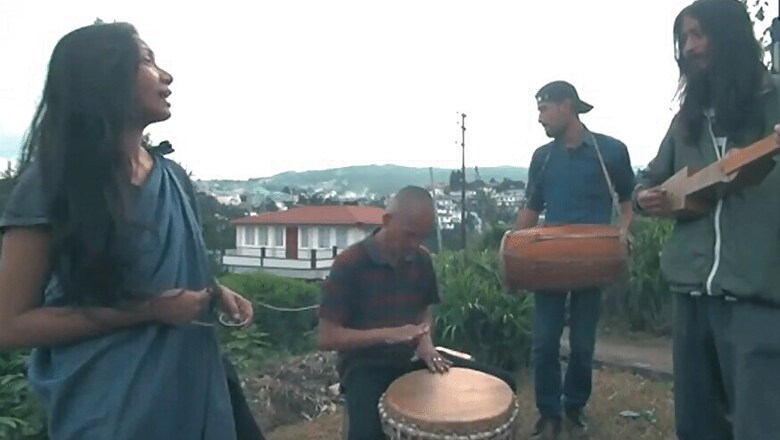
views
The music created by Meghalaya-based experimental band 'Rida and The Musical Folks' often has the rawness and earthy quality of folk songs along with a hint of jazz, or contemporary western tunes. Through their music, the band has not only started a revivalist movement to bring back the traditional tunes of Meghalaya into public consciousness but also are making a strong statement about environmental issues.
Their melodies are pure, harmonious and uncluttered; they often reconcile you with nature, because like most folk songs, they are in some way or the other inspired by nature. However, it is their lyrics that drive home the message of climate change. Rida Gatphoh, who is the lead member of the band and also the songwriter and composer, juxtaposes the simplicity of traditional folk tunes of Meghalaya with hard-hitting lyrics about the effects of man's activities on nature.
The lyrics of their songs are mostly an expression of Rida's observations of the way her home state's environment has changed over the years. "I noticed how these hills were being eaten up. They are almost gone now. People, who live right down the river, don't even understand that mining can really affect the entire water system they depend on," said Rida.
The musician started noticing issues that most people seemed to be unaware of. This is when her writing changed. “I started writing more on these environmental issues and eventually, it became more like an experiment. I think it is the journey that I went through that connected me to nature," she added.
Some of the songs by 'Rida and The Musical Folks' are in English (while some are in Khasi), and if you listen to them once you will know that more than songs, they are stories or poems about the nature.
Their song 'Trouble' shows a strong contrast between Rida's experience of living in Mumbai and how the habitat of a metropolitan city is different from a place like her hometown, Shillong. Talking about the difference in the environment and the pollution levels, Rida said, "I noticed that the water that I drink, the air that I breathe, and the very livelihood is different in Shillong. I can feel that the food I eat here tastes different and better."
While Rida and The Musical Folks often talk about devastating effects of man's encroachment into nature, their songs are not doleful and sad. "Shinning is one song where we still hope for better. Same with our song techno-centric, which talks about the corporate world. Since I have been a part of that world before, I know how we become like machines there. It is important to reverse that process for which we have to really slow ourselves down. That kind of experiences helped me to write. Although it took years before I started writing," recalled Rida.
Not just the lyrics, the instruments that Rida and The Musical Folks use are all made by them (except the acoustic guitar) and from natural objects (like trees and bamboo). So, in a way, their instruments are also an extension of nature.
"I started off with instrument making because I was very involved in music," confessed Rida. It was while learning the craft of instrument making that she met her current band mates, who are instrument makers too. She brought together a motley group of talented musicians, most of them in their 50s who knew the old tunes and music of Meghalaya, and that is how their band, Rida and The Musical Folks came into being.
Since Meghalaya has a tradition of oral history, with the new generation moving towards popular and rock songs, their music, as well as old instruments, are going into oblivion over time. Therefore, Rida and The Musical Folks started using the old folksy tunes in their songs to keep their tradition alive.
Apart from instruments they also create handmade crafts as well as pottery to keep the tradition of Meghalaya alive. Peter Marbaniang, who is also a member of the band, not only plays a duitara that he has made himself, but also is a ceramic artist.
"I have worked a lot on traditional crafts and I make them with my own hands. I have also made my own duitara and taught myself how to play it. Crafts are dying in our state, and it is our responsibility to save them," said Marbaniang.
"Most of our crafts are made out of nature, including our instruments, so in some ways, our instruments are also connected to nature," he added.
Marbiniang said that music was just another platform to connect to the roots and create awareness about the beautiful and rich nature of Meghalaya. "Music is a form to make people understand and aware the environment. A lot of people has been getting back to us saying that they connect to our music and the message that we send out," said the duitara player.
Other prominent band members of Rida and The Musical Folks include Sean Menzies Nongrum, who is a sound engineer as well as a Bom Player, Shaun Nonghuloo Morehead, who is a drummer and Amarnath Hazarika, who is the guitarist. Bah Rojet Buhphang, who received the Ustad Bismillah Khan Yuva Puraskar in 2007, for his contribution to Meghalaya's traditional music, is also part of the band.
Rida and The Musical Folks are still planting their feet on the ground as a band, but they are in touch with the realities--the problems and threats that climate change poses. “A good way to understand the environmental changes around us is to feel connected to it, to understand the sound around you, and feel the energies around you," said Rida.
“Once that happens, we automatically become conscious of our actions and how that is impacting the surroundings," she said.
At a time when world leaders are still denying climate change, it is not only important for scientists to remind people of the magnitude of threat that looms on entire humanity but also for writers, painters, dancing and musicians to help people understand this threat, and provoke them to take actions. They are painting the picture that hits hard.
#ClimateArt is our series to discover how art, music and literature have the potential of changing opinions and beliefs about climate change.
















Comments
0 comment